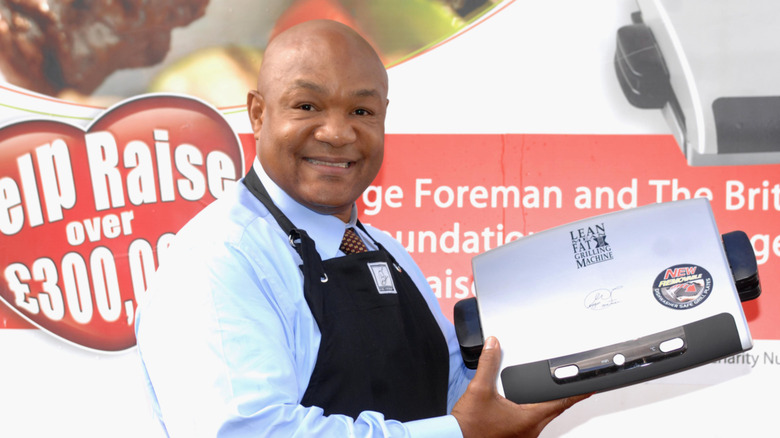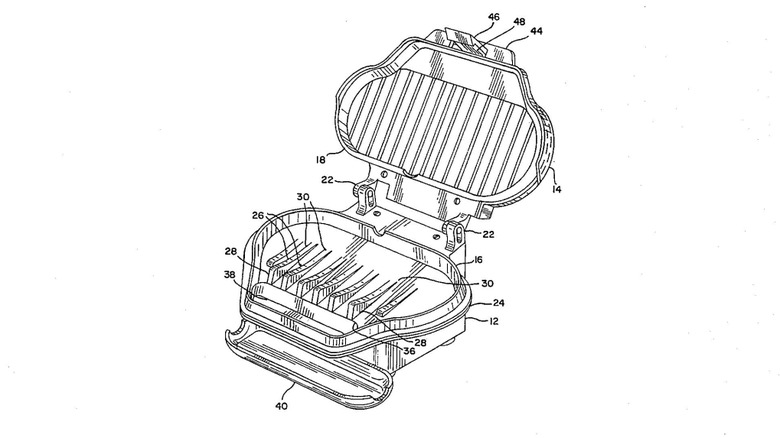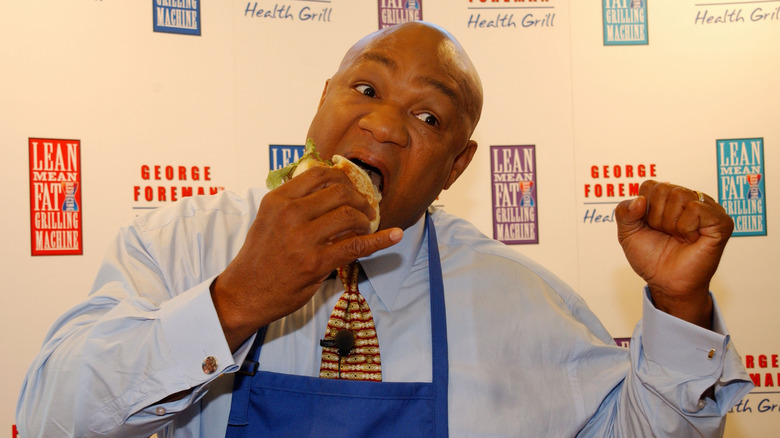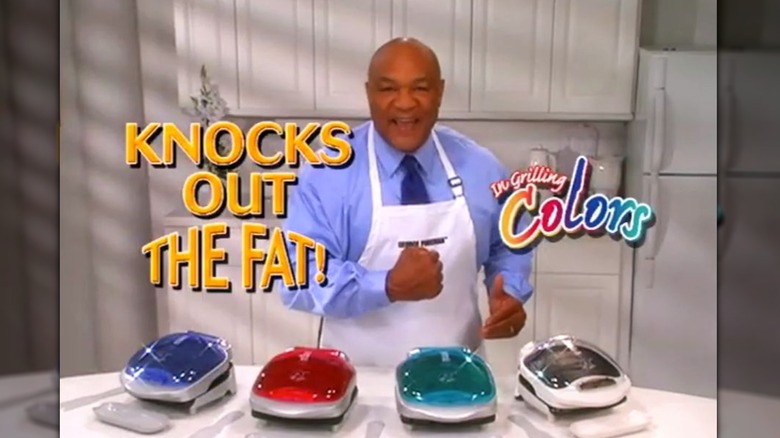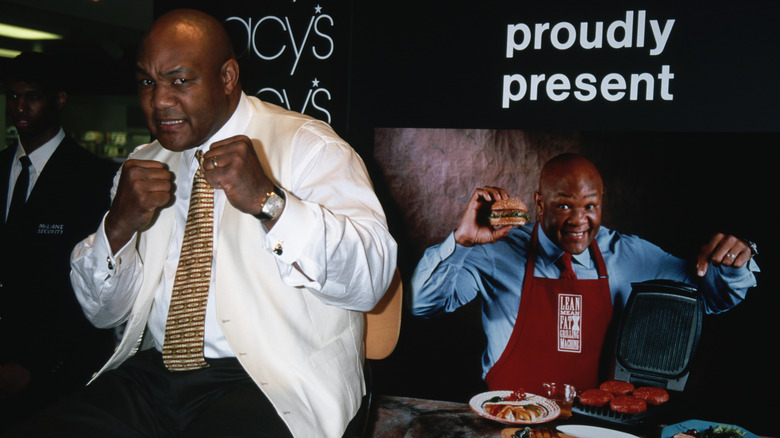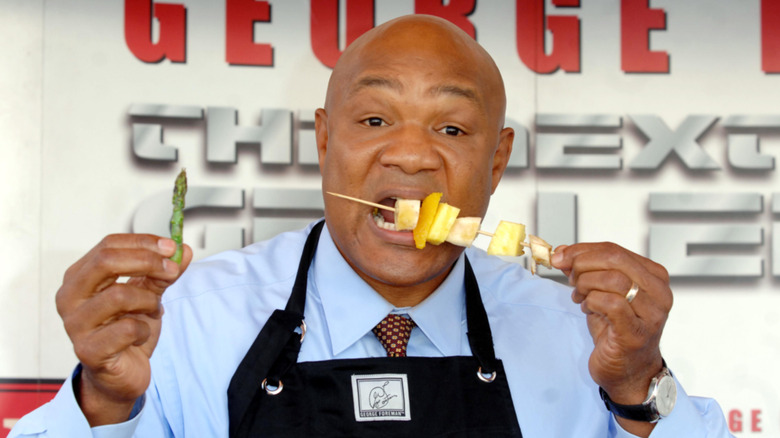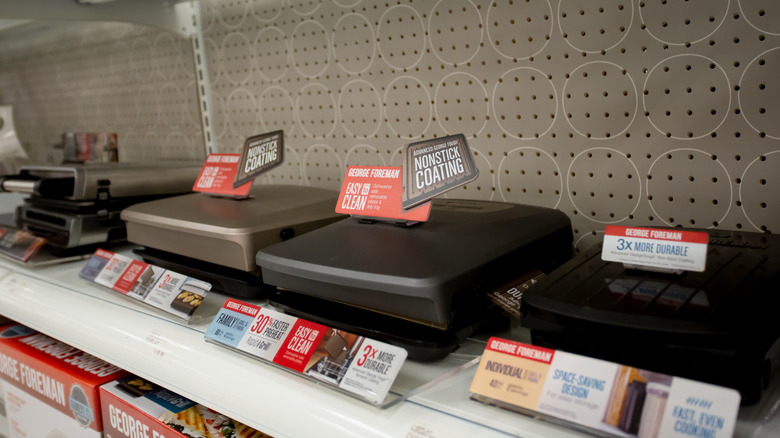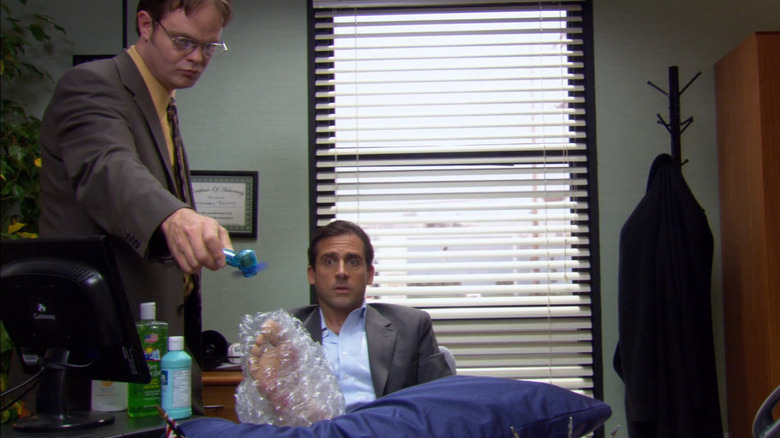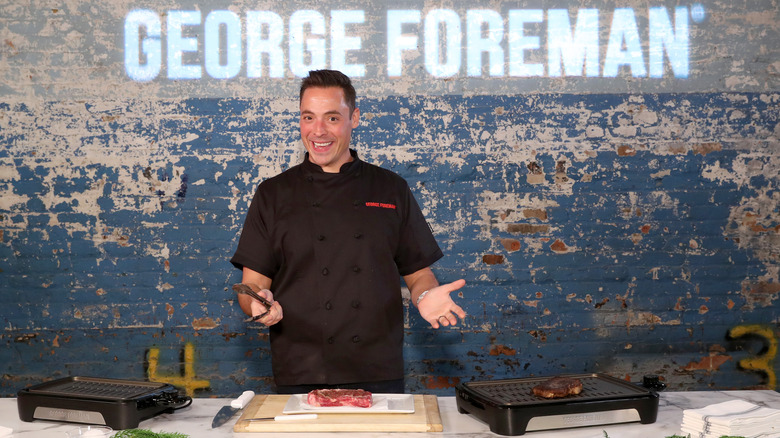How The George Foreman Grill Became A Kitchen Appliance Heavyweight
The late George Foreman made quite a name for himself in the boxing ring in a professional career that netted 76 wins, with 68 by knockouts. After retiring in 1977 to become a preacher, he returned to the ring a decade later. In 1994, he miraculously regained the heavyweight titles, before hanging it up for good in 1997. All along the way, Foreman had a winning smile that he lent many times as a pitchman for products like Meineke, Doritos, McDonald's, Oscar-Mayer, Kentucky Fried Chicken, and Nike.
Foreman often recalled in interviews when a friend told him, "George, you're making all these other companies wealthy — why don't you get your own product." That's easier said than done, but things started to heat up for Foreman when his wife discovered an innovative dual-sided grill for the kitchen invented by Michael Boehm. The former champ made a new name for himself when he lent his name to Boehm's creation, and pitched it personally in infomercials. The George Foreman Lean Mean Fat-Reducing Grilling Machine quickly became a champion retail item in its own right.
The grill went on to expand its line of offerings, take on its competition's imitators, and is still standing after all these years. Today, it is simply known as The George Foreman Grill, a product that has been celebrated in pop culture and has held major relevance within the culture at large for the last three decades. Let's un-box the history of this grill and see how it truly became an undisputed heavyweight of the household appliance industry.
The Short Order Grill
While many people believe George Foreman invented his own grill, that title belongs to Michael W. Boehm. Boehm has tinkered with new concepts for lamps, snowmobiles, and lawnmowers, but made his quiet mark in the form of the grill.
While working as a general manager for the USA division of the Chinese manufacturer Tsann Kuen, Boehm noticed the trends for healthier eating, and started working on a new kind of grill to match. His first product was The Steam Grill, which debuted in 1991. It wasn't exactly a hit, and so he started on one that was fat-reducing. In an interview with Entrepreneur, Boehm recalled, "I heated a cast-iron baking sheet, set it at an angle, and started cooking on it. Would the grease drain? Would the food cook? It did! I was very happily surprised that first time. As crude as it was, it worked." Boehm further refined his invention, and with engineer Robert W. Johnson, filed a patent in 1993 for an "electrical cooker" device that "cooks foodstuffs without the need for oils, fats and similar substances."
This new product was first called the Great Hamburger Maker, before eventually becoming known as the Short Order Grill. Boehm was having trouble selling this new kitchen tool, who thought the food would slide off the slanted plates. Eventually, after nine companies passed, Salton Inc. signed on to manufacture it, who first brought it to market in 1994 as the Lean, Mean, Fat-Reducing Grilling Machine.
The Grill finds a champion in a boxer's wife
Foreman had a steady second stream of income as an endorser, and pitchman for products and companies. His attorney friend Sam Perlmutter turned his attention to maybe finding a product that he could literally call his own. Marketer Mike Srednick got Salton's grill onto Perlmutter's radar, but Foreman gave it a once over before putting it back in the box to be forgotten. Foreman later told The Washington Post, "No way. I'm not going to put my name on that. I want a steak, not a pancake." However, Foreman's wife, Mary Joan Martelly, actually gave the grill a whirl, and was impressed with the meats' juicy results, with the grease literally sliding off. She made her husband a burger, and for Foreman, it was love at first bite. He was also a fan that it was easy to clean the grill itself.
He signed on with Salton with nothing up front, and 45% of the future profits, with Boehm receiving zero in royalties. However, becoming a literal household name because of the grill wasn't initially at the forefront of Foreman's mind. Foreman's desires were much simpler, as recalled in his book "Knockout Entrepreneur," "I just signed the contract so I could get sixteen free grills for my homes, my training camp, my friends, my mom, cousins, and other family members. That's all I really expected to get out of the grill deal. I never dreamed this opportunity would turn into a grilling empire!"
As Seen On TV
Foreman approached his new grill like he was training for a heavyweight fight. He told CNBC, per Inventors Digest, "I was going to be that product." Not only was his autograph being printed on the actual product, but he was going to be the face of it, as well. The earliest iterations of the infomercials leaned heavily on his boxing pedigree, and showed clips of him in his ring heyday. Playing up his past glories didn't exactly turn viewers into buyers, so out went his glove, and in went the love... of his family, to show a more relatable side.
Sales remained rather slow going, but things quickly heated up after Foreman's first appearance on T.V. shopping network QVC to hawk his products. While the hosts were chatting away about the virtues of the grill, Foreman at one point picked up a grilled burger and ate it on camera, which caused the phone lines to light up. Salton CEO, Leon Dreimann was on hand to witness this ah-ha moment, and later telling Fortune, "It was so spontaneous. It was a real reaction. People saw that he eats what he sells." A star was (re)born, and a grill was flying off the shelf and into people's homes.
George Foreman's good name sells and is sold
George Foreman's natural ability to pitch products, matched with a product people actually loved, made the Lean, Mean, Fat-Reducing Grilling Machine quite the hot item to have in one's home. This was great news for Salton whose sales totaled $183 million in 1997, and by 2002, $922 million.
In order to ensure Foreman's name would stay on, even if the boxer himself moved on, Salton gave the face of its product an offer he couldn't refuse. In 1999, Foreman agreed to the sum of $137.5 million in dollars and stock, in exchange for Salton to obtain the exclusive rights to use his name to sell food preparation products. That payout was a total greater than what he made in his entire boxing career.
Just because the royalties were disappearing didn't mean Foreman was leaving the grill game. At the time, he was still contractually connected to the product, and was more than happy to stick around, smiling, and selling the grills. Salton even made sure they got his blessing on new products carrying his name. He told Fortune, "As I've got the health and strength to do it to give them 100% of me," adding, "I wouldn't trust anyone else out there with the product."
Millions of Foreman Grills land in homes, and even restaurants worldwide
With such growth, the George Foreman Grill further expanded its line of offerings, both inside and outside the house. This led to its ubiquitousness in households all over the world. It made for a great holiday gift, and with newer versions being released, some people even upgraded from their old ones.
While a home was the primary residence of these grills, restaurants even employed them in food preparation. Famed Central Park venue Tavern on The Green even admitted to using them. Executive sous-chef Stephen Moise told The New York Times, ”It's incredibly convenient," adding, ”It means we can grill the tuna as soon as a salad is ordered without running back and forth to the kitchen.”
While some questioned whether the grill really reduced fat over other cooking methods, or whether it even produced good tasting food, people ate up its quick turnaround times for meals, and ease of clean-up. One person believed in its powers so much, they misguidedly attempted to make cookies on them. By 2003, 20 models of Foreman Grills were available on shelves and through the infomercials, with 10 million units of them sold in the United States, and five times that around the world. Three years later, Jackie Chan even signed on to help sell the grills to the Asian market.
The Hot Grill's Sales Start to Cool Off
Every prizefighter takes his licks, and the champion home appliance George Foreman Grill had its own fair shares of ups and downs to Salton. After paying a pretty penny to obtain Foreman's name, the company began to see sales slow as it faced more competition in the marketplace, from Hamilton Beach and its Health Smart Grill and West Bend's similarly named Health Smart. Houseware marketing specialist A. J. Riedel of Riedel Marketing Group told The Wall Street Journal in 2001, "They've invested big time in George Foreman. I don't know how many products [the Foreman name] can extend to."
Salton's other products weren't exactly moving the needle, putting further pressure on the Foreman line. After a series of stock buybacks, CEO Dreimann told The New York Times, "The shorts keep saying that we're a one-trick pony and that our earnings will go away, but management has high expectations that we're going to be able to continue our growth.” In 2004, Salton saw its deficit increase from $12 million to $58 in just a year. Further woes for Salton included price-fixing allegations, by which it prevented retailers from discounting the grills. It eventually settled the matter for $8 million dollars.
After merging with the company Applica, Salton changed its name to Russell Hobbs Inc. In 2009. A year later, that company was acquired by Spectrum Brands, who still sells the George Foreman Grills till this day, although without the help or employ of Foreman himself as an endorser.
Pop Culture Props and Punchline
Another reason the George Foreman Grill has forever remained in the public consciousness is thanks to being named dropped and visually seen in an array of pop culture icons. Its praise has been sung about by the likes of Kendrick Lamar, Wale, RZA, and even the Blue Man Group, and was even the inspiration for a Play-Doh set for kids. It's been referenced, for both laughs and in all seriousness in films like "Chef," "RV," and "Man of The Year," and seen and heard on T.V. shows like "Gilmore Girls," "The Sopranos," "The Big Bang Theory," "Kevin Can Wait," "The O.C.," "Family Guy," "Modern Family," "Brooklyn Nine-Nine," "BoJack Horseman," and sort of on "The Simpsons," who love using the "George Foreman Mail Sorter."
However, no public appearance has perhaps been as indelible as the one it had in "The Injury" episode in season 2 of The Office. In this episode, penned by Mindy Kaling, Steve Carell's Michael Scott character calls into the office from him in a panic, as he's been injured. He explains that he loves breakfast in bed, as well as the smell of waking up to bacon so much, that he sets up a George Foreman grill to cook strips of them when he wakes up. That one morning, he made the mistake of stepping on the grill, imprinting his foot with grill marks, and thus "The Injury." Hilarity definitely ensued, and co-star Jenna Fischer said in a T.V. Guide blog post that Carell's work, "is the greatest interview of the entire series. I think his performance is brilliant. Seriously, brilliant."
George Foreman remains a champ of cooking products
Although George Foreman died in March 2025, his name remains one of the most synonymous with indoor grills. In the years leading up to his death, Foreman would still get complimented in public for his grills, and even mistaken as its inventor, much to Michael Boehm's dismay, who would often carry his patent around to prove otherwise. If you were ever curious what Foreman's favorite meal to make on the grill was, TMZ cornered him in 2015, where he admitted it was salmon steaks.
Under the stewardship of Spectrum Brands, the George Foreman Grills remains a champ in sales, going toe to toe, and even surpassing the likes of rivals Hamilton Beach, Cuisinart, and Ninja. Today, basic Foreman Grills come in two to five serving sizes, with some retailing as low as $25. Other options in the line-up include smokeless grills, indoor/outdoor ones, and ones that go "beyond grilling," like an air fryer and a quesadilla maker.
If the plug ever gets pulled on the George Foreman line of grills, its place in history is forever cemented. The Smithsonian even has a George Foreman Lean Mean Fat-Reducing Grilling Machine held for safekeeping, as a part of the permanent collection of the National Museum of American History.
